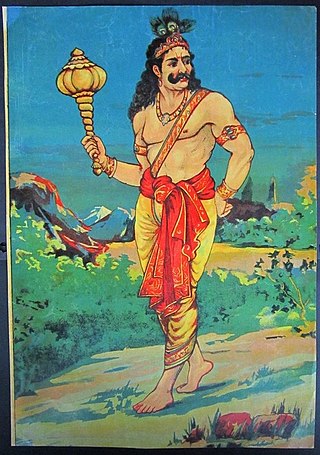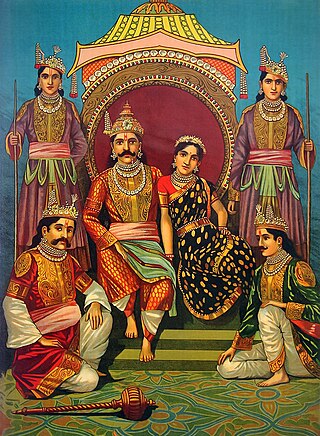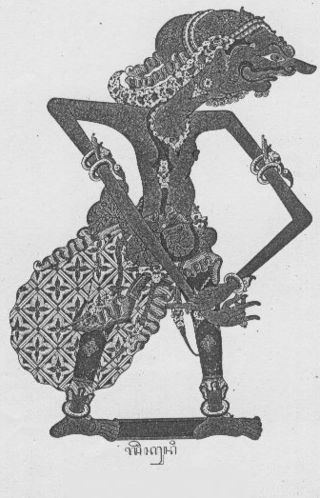Related Research Articles

The Mahābhārata is one of the two major Smriti texts and Sanskrit epics of ancient India revered in Hinduism, the other being the Rāmāyaṇa. It narrates the events and aftermath of the Kurukshetra War, a war of succession between two groups of princely cousins, the Kauravas and the Pāṇḍavas.

In the Hindu epic Mahabharata, Bhima is the second among the five Pandavas. The Mahabharata relates many events that portray the might of the hero Bhima. Bhima was born when Vayu, the wind god, granted a son to Kunti and Pandu. After the death of Pandu and Madri, Kunti with her sons stayed in Hastinapura. From his childhood, Bhima had a rivalry with his cousins Kauravas, especially Duryodhana. Duryodhana and his uncle, Shakuni, tried to kill Bhima multiple times. One was by poisoning and throwing Bhima into a river. Bhima was rescued by Nāgas and was given a drink which made him very strong and immune to all venom.

Duryodhana, also known as Suyodhana, is the primary antagonist in the Hindu epic Mahabharata. He was the eldest of the Kauravas, the hundred sons of the king Dhritarashtra and his queen Gandhari.

Gandhari is a prominent figure in the Hindu epic the Mahabharata. She was the princess of the Gandhara Kingdom and wife of Dhritrashtra, the blind king of Kuru. In the epic, she is depicted with a blindfold, which she wore in order to live like her blind husband. Due to divine boons, she became the mother of a hundred sons, the Kauravas, who are the primary antagonists of the epic. She also had a daughter named Duhsala. Following the Kurukshetra War and the end of her hundred sons, Gandhari cursed Krishna, leading to the destruction of his Yadu Dynasty.

Pandu was the king of Kuru kingdom, with capital at Hastinapur in the epic Mahabharata. He was the foster-father of the five Pandavas, who are the central characters of the epic.

Hastinapur is a city in the Meerut district in the Indian state of Uttar Pradesh. Hastinapura, described in Hindu texts such as the Mahabharata and the Puranas as the capital of the Kuru Kingdom, is also mentioned in ancient Jain texts. Hastinapur is located on the right bank of the Ganga river.

Madri was the princess of Madra Kingdom and the second wife of Pandu, the king of Kuru Kingdom in the epic Mahabharata. Madri, with the assistance of her co-wife Kunti, invoked the twin deities Nasatya and Darsa, collectively known as the Ashvins, and from their blessings, gave birth to the youngest Pandavas—the twin brothers Nakula and Sahadeva.

Yudhishthira also known as Dharmaraja, was the king of Indraprastha and later the King of Kuru Kingdom in the epic Mahabharata. He is the eldest among the five Pandavas, and is also one of the central characters of the epic.

Nakula was the fourth of the five Pandava brothers in the ancient Indian epic, the Mahabharata. He and his twin brother Sahadeva were the sons of Madri, one of the wives of the Pandava patriarch Pandu, and Ashvini Kumaras, the divine twin physicians of the gods, whom she invoked to beget her sons due to Pandu's inability to progenate. Nakula is described as the most handsome man of his lineage, and was renowned for his beauty, skill in swordsmanship and horse keeping.

Shakuni is one of the antagonists of the Hindu epic Mahabharata. He was the prince of the kingdom of Gandhara when introduced, later becoming its king after the death of his father, Subala. He was the brother of Gandhari and the maternal uncle of the Kauravas.

Kosala is the kingdom of Rama mentioned in the Ramayana. Ayodhya was its capital, now located in Ayodhya, Uttar Pradesh. Rama's sons Lava and Kusha inherited parts of this kingdom. Lava ruled from the city called Shravasti and Kusa from the city called Kushavati. A colony of Kosala kings existed in Madhya Pradesh. It was called Dakshina Kosala. Rama's mother Kausalya was from this kingdom. Rama extended his influence up to the island-kingdom of Lanka situated in the Indian Ocean. He had friendly relations with the southern kingdom of Kishkindha.
The Kunti kingdom was the kingdom of Kunti-Bhoja, one of the prominent kings among the Bhoja-Yadavas.
Saurashtra kingdom was one of the kingdom among the many kingdoms ruled by Yadava kings in the central and western India. Other kingdoms in this group include Chedi kingdom, Dasarna kingdom, Surasena kingdom or Vraja kingdom, Karusha kingdom, Kunti kingdom, Avanti kingdom, Malava kingdom, Gurjara kingdom, Anarta kingdom, Dwaraka kingdom, Heheya kingdom and Vidarbha kingdom.
Danda is a region frequently mentioned in Hindu mythology, and is prominently featured in various narratives, such as Dandaka, which refers to both a kingdom and forest of the same name. Danda was a colonial state of Lanka during the reign of Ravana, with his governor Khara ruling the province. The region served as a stronghold for all the Rakshasa tribes living in the Dandaka Forest

Mahisha or Mahishaka was a kingdom in ancient India. The capital, Mahishuru, is currently known as Mysore, a city in Karnataka. This kingdom is mentioned in Mahabharata, though Puranas gives more information. The name Mahisha means great, powerful.
In the Mahābhārata, Kinnara is a kingdom in the Himalaya mountains described as the territory of a people known as the Kinnaras. The Kinnaras, along with other exotic tribes, were inhabitants of the Himalaya mountains. In the epic Mahābhārata, the Kinnaras are described as half-man and half-horse beings, living at Mount Mandara.

The Himalaya kingdom was a mountainous country in the Himalayas, mentioned in the Puranas. In the puranas, Himavat was its ruler and his daughter Parvati was a princess from this kingdom. The Indian epic Mahabharata doesn't mention a kingdom named Himalaya, but mentions many kingdoms in the Himalaya mountains like the Kuninda, Parvata, Nepa, Kirata, Kimpurusha, and Kinnara.
In the Hindu epic Mahabharata, Krishna is the son of the Yaduvamsha chief Vasudeva and his wife Devaki. He is also widely known by his epithet, Vāsudeva.

Ashwatthama, also referred to as Drauni, is the son of Drona and Kripi/ Krupi a warrior of Indian History, the Mahabharata. In the epic, he serves as a friend to Duryodhana, the eldest of the Kauravas. He was trained in warfare along with the Kauravas and the Pandavas by his father, Drona. He is also described as a Maharathi who fought on the side of the Kauravas against the Pandavas in the Kurukshetra War and was cursed by Krishna with immortality for his attempt to kill Uttarā's unborn child. Ashwatthama had gained knowledge of various divine weapons, namely the Narayanastra, Brahmastra, Brahmashirastra, and many others.
References
- Mahabharata of Krishna Dwaipayana Vyasa, translated to English by Kisari Mohan Ganguli